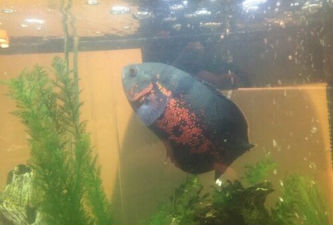Oscar fish as pets typically live 8 to 12 years in captivity
 Oscars can indeed make good pets for aquarium enthusiasts who are prepared to meet their specific needs. These impressive fish are known for their striking appearance and unique personalities, which can make them a fascinating addition to your home aquarium. However, there are crucial considerations to keep in mind. Oscars can grow quite large, requiring a spacious tank of at least 75 to 100 gallons for a single fish.
Oscars can indeed make good pets for aquarium enthusiasts who are prepared to meet their specific needs. These impressive fish are known for their striking appearance and unique personalities, which can make them a fascinating addition to your home aquarium. However, there are crucial considerations to keep in mind. Oscars can grow quite large, requiring a spacious tank of at least 75 to 100 gallons for a single fish.They are also inherently aggressive, which means careful planning is essential when selecting tankmates to avoid conflicts. It's advisable to choose large, robust cichlids as companions if you wish to house them with other fish. Additionally, Oscars thrive on a carnivorous diet, so providing them with a balanced and varied menu is crucial for their health and well-being. With the right setup and diligent care, Oscars can be rewarding pets for those willing to invest the time and effort needed to meet their requirements.
Oscars behave more similar to humans than most fish, are more intelligent, their actions seem to have meaning behind them, this makes Oscar fish the perfect pets. Perhaps this is why they are sought out as an ideal fish by hobbyists. Despite their large adult size, their messy eating habits, and at times, their destructive behavior, they seem to have become extremely popular with hobbyists.
Oscar fish Sulking
It is not uncommon for oscars to sulk at the bottom of the tank, this can last for hours or days depending on the oscar. There are many possible reasons for this behavior, here are the most common: poor water quality, the addition or loss of a tank mate, rearranging their tank, and changing their diet. To most oscars, change means stress, it is during these stressful events that an oscar will resort to the bottom of the tank. Oscars also "sleep" at the bottom of their tanks, but this usually takes place when the room is completely dark. Also note that resting at the bottom of the tank for an extended period of time may indicate an illness (most commonly ammonia poisoning).Oscar fish Aggression
Oscars are cichlids and some aggression is to be expected from time to time. Most often, these outbursts come from territorial issues with other tank mates. The other time that aggression may be highly visible is during courtship/breeding. If courting/breeding oscars are kept with other fish, the tank should be watched closely for signs of extreme aggression to avoid the unnecessary death of other tank mates. At times, it may be necessary to take action against aggression, this is most often accomplished by rearranging the tank (disorienting them), the addition of a divider, or complete removal of the offending fish.Oscar fish Other Annoying Behavior
Oscars have a love of rearranging their homes, much to their owners dismay. An oscar can be very persistent in his efforts to accomplish this, and it is usually the oscar that ends up winning. If your oscar has a need to redecorate, try not to fight this behavior too much, when the tank decorations are set out as your oscar wants them he/she will leave them alone.. until the next time. If your oscar is constantly doing this, it might be a good idea to add some toys to the tank, for example: a ping pong pall, or a plastic thermometer (oscars will break glass ones). There are other things that oscars like to play with as well, I have a two part magnetic diver that my oscar loves. He pulls on the little man's flippers so hard that the diver separates, he continues to drag the diver all over the bottom of the tank by his flippers. It's quite comical to watch this in action.Oscar fish Refusing to eat
There may be the odd time that your oscar will refuse food of any kind, this is often a result of stress, illness, a change in diet, or simple displeasure. Oscars can live without food for weeks, so don't worry too much about your oscar starving to death. Look for signs of illness, or a display of other abnormal behavior.Just like people, each oscar seems to have his or her own personality, likes and dislikes. Some oscars never attempt to redecorate the tank, while others are so persistent on having the tank their way, that their owner gives up. Some oscars aren't prone to severe aggression, while others are so dominant that they must live alone. The above outlines some of the normal behavior when it comes to oscars, don't limit the lines of normalcy to this article.. as far as oscars go, anything is possible.







